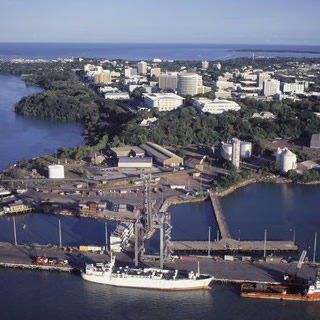State of Markets - NT February 2015

In the year leading up to December, Darwin recorded growth of 1.6 per cent, according to CoreLogic RP Data.
This figure leaves the Northern Territory some way behind the annual capital city average of 7.9 per cent.
Darwin also performed poorly in the final quarter of 2014, with home values decreasing by 1.7 per cent.
SQM Research property analyst Louis Christopher expects that Darwin’s slow growth will continue into 2015. He identifies Darwin as the weakest capital city market, citing climbing vacancy rates as a particular problem.
Mr Christopher describes Darwin as a classic example of a ‘shallow’ housing market, explaining the market’s minimal volume and depth causes prices to rapidly swing one way or the other.
Moving into 2015, prices are swinging south, he says, primarily due to the commodities downturn – which shows no sign of stopping any time soon.
However, Raine & Horne believes that a recovery in the tourism sector would prompt interstate investors to return to the Northern Territory city.
Glenn Grantham, general manager of Raine & Horne Darwin, explains that a few years ago, interstate buyers totally dominated the Darwin investment property market.
While these buyers now represent just five per cent of the investment market, Mr Grantham expects this will change as a result of improved interstate tourist numbers.
According to figures released by Tourism Research Australia’s National Visitor Survey, there was a 14 per cent increase in total domestic visitors to the Northern Territory for the year to September 2014, compared to the previous year.
Mr Grantham says that these are the Northern Territory’s best visitor numbers in five years, and with a strong correlation between tourism and interstate property investors, he’s expecting the Darwin market to surge in the second quarter of 2015.
Moreover, Mr Grantham believes that the provision of a $26,000 grant for first home buyers to purchase a house and land package from 1 January 2015 will have wide-ranging implications for Darwin real estate.
In focus
Johnston is a suburb in the city of Palmerston, located close to Darwin harbour.
The area’s tropical climate has encouraged the growth of water‑based leisure activities in recent years.
The well-established fishing charters at the nearby beaches run expeditions all year round and are in very high demand.
Residents can also spend days in the sun at the nearby Palmerston Water Park.
We’ve seen steady investor activity in Johnston over 2014 and expect this trend to continue into 2015.
However, investors looking at the area should expect to pay a premium price for land. Well-sized plots, depending on the part of Johnston they are in, cost anywhere between $200,000 to $300,000.
To give investors an idea of the area’s land value, a four-bedroom house will usually cost around $350,000 to $400,000.
A brand new four-bedroom house and land package will cost around $550,000 to $600,000.
Although Johnston’s rental market is not as strong as it was 12 months ago, I feel that the entire Northern Territory rental market was inflated during this time. Rents seem to be coming back down to a more sustainable level, and yet are still at a much higher level than most other states.
I think that a conservative softening of the rental market now, as opposed to a drastic drop in rents in the future, will be good for the area in the long run.
Because there is currently a unit oversupply problem across large parts of the Northern Territory, I would advise investors to steer clear of this type of property.
A significant proportion of Johnston’s units were built with unrealistic capital growth and rental yield expectations.
For this reason, I feel that a house and land package would be the right way to go. If an investor was to rent out a house and land package, this type of property is more likely to attract long‑term occupiers.
In 2015, I feel we will see a plateau in the market both in Johnston and the wider Northern Territory.
Growth figures have consistently been in the double digits over the past few years, and this trend simply can’t go on for ever. However, moving forward five to 10 years, I feel that the landscape of Darwin and surrounding areas will be unrecognisable.
The local economy is very versatile and has enabled the area to become the gateway to Asia. Perhaps more importantly, a lot of Asian countries see the Northern Territory as the gateway to Australia. This perspective could be the key to the state’s future success.
Fast 5 Hotspots
Tennant Creek